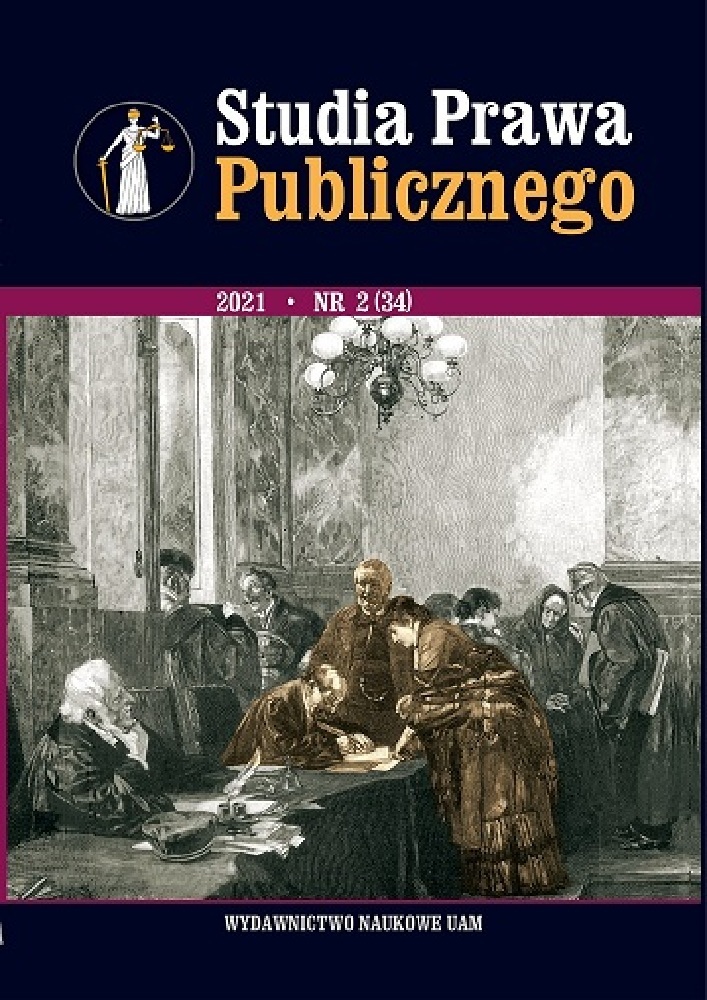Abstrakt
On October 1st 2020, a new institution was introduced to the Act on the Police – the incentive benefit. It is intended by the legislature to keep officers with at least 25 years active service. Awarding this benefit depends on the period of service held by the officer. The regulation relating to the incentive benefit also provides for a number of negative premises, the materialization of which results in the refusal to grant the benefit. This article is entirely devoted to the issue related to the refusal to grant an incentive benefit in the cause of initiating criminal proceedings against a Police officer. It was therefore necessary to indicate at what point the stage of criminal proceedings changes from in rem to ad personam, because this results in initiating them against a specific person. The change in the stage of criminal proceedings depends on the offence it concerns. If it is a public prosecution offense, the change takes place in connection with the presentation of charges to the specific person. However, in the context of Art. 120a (7) (2) Act on the Police, the initiation of criminal proceedings against a specific person should be equated with the very fact of drawing up a decision on the presentation of charges. However, it is different in the situation specified in Art. 55 § 1 of The Code of Criminal Procedure, or in proceedings in cases prosecuted by private prosecution. The mere submitting of a subsidiary indictment, private indictment or complaint results in the initiation of proceedings against a specific person, provided that they have been submitted effectively. It was also emphasized that the administrative authority is bound by decisions undertaken in the criminal proceedings and cannot make any independent determinations in this regard, as it cannot interfere with the competences reserved to another entity.
Bibliografia
Drajewicz D., Uwagi do art. 71, w: Kodeks postępowania karnego, t. 1: Komentarz. Art. 1–424, pod red. D. Drajewicza, 2020, Legalis/el.
Gacek P., Obligatory suspension of a Police officer from official duties, „Acta Iuris Stetinensis” 2019, no. 4(28).
Gardocki L., Prawo karne, Warszawa 1999.
Gensikowski P., Uwagi do art. 487, w: Kodeks postępowania karnego, t. 1: Komentarz. Art. 1–424, pod red. D. Drajewicza, 2020, Legalis/el.
Grzegorczyk T., Tylman J., Postępowanie karne, Warszawa 2007.
Marszał K., Proces karny, Katowice 1998.
Nowikowska M., Uwagi do art. 39, w: Ustawa o Policji. Komentarz, pod red. K. Chałubińskiej-Jentkiewicz, J. Kurek, 2021, Legalis/el.
Nowikowska M., Uwagi do art. 120a, w: Ustawa o Policji. Komentarz, pod red. K. Chałubińskiej-Jentkiewicz, J. Kurek, 2021, Legalis/el.
Szołucha S., Uwagi do art. 55, w: Kodeks postępowania karnego. Komentarz, pod red. J. Skorupki, 2020, Legalis/el.
Światłowski A., Uwagi do art. 487, w: Kodeks postępowania karnego. Komentarz, pod red. J. Skorupki, 2020, Legalis/el.
Waltoś S., Proces karny, Warszawa 2003.
Waltoś S., Hofmański P., Proces karny. Zarys systemu, Warszawa 2018.
Wytrykowski K., Uwagi do art. 55, w: Kodeks postępowania karnego, t. 1: Komentarz. Art. 1–424, pod red. D. Drajewicza, 2020, Legalis/el.
Licencja
Prawa autorskie (c) 2021 Paweł Gacek

Utwór dostępny jest na licencji Creative Commons Uznanie autorstwa – Użycie niekomercyjne – Bez utworów zależnych 4.0 Międzynarodowe.

